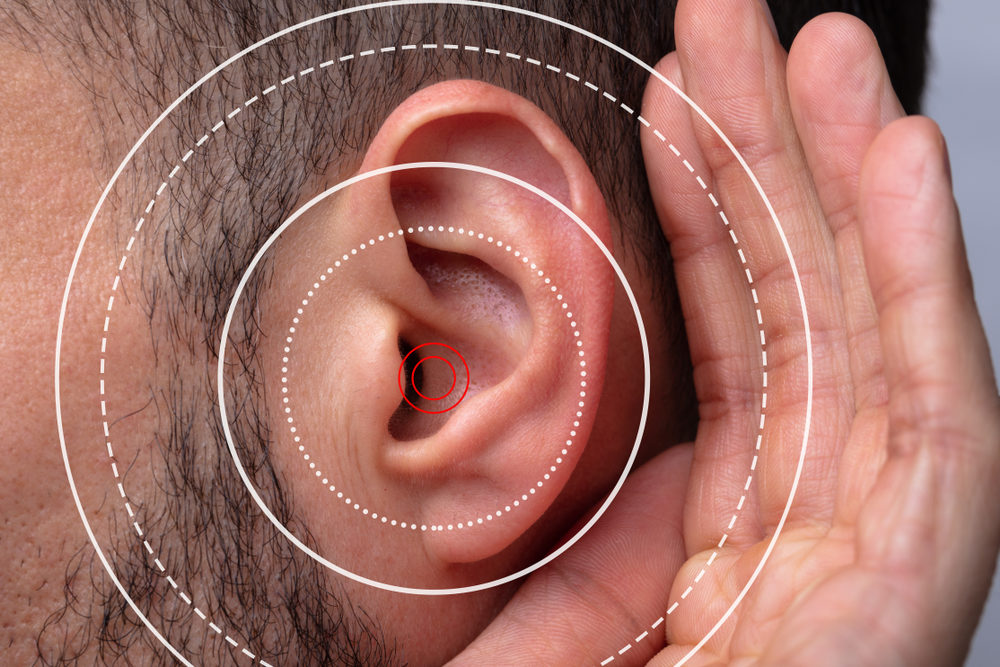Millions of Americans suffer from tinnitus – the perception of sound without an external source, so others cannot hear it. Sounds such as ringing, roaring, or buzzing are not usually severe enough to significantly affect daily life but can worsen sleep, concentration, and mood. An estimated 10-25 percent of adults and some children have or will develop tinnitus, which has no known cure. For some, tinnitus may be temporary or decrease/stop completely over time. But for others, it can persist for years or a lifetime.
Tinnitus symptoms are individual in nature, but most include some degree of hearing loss. Possible sounds include squeals, hisses, ringing, buzzing, roaring, whistling, humming, clicking, or a combination of these. People with tinnitus report hearing low and high-pitched sounds and soft and loud noises intermittently or consistently.
Causes of Tinnitus
Tinnitus can be medically challenging, as it has a variety of potential causes. Most tinnitus is subjective because only the patient can hear the sounds. In the rare case of objective tinnitus, a medical professional can listen to the sounds via a stethoscope because they pulsate in time with the patient’s heartbeat. This type of tinnitus usually has an identifiable cause and treatment.
Tinnitus may be due to head or neck injuries that damage the inner structure of the ear, the nerves that carry sound to the brain, or areas of the brain itself that process sound. Blockages of fluid in the ear canal from an infection or earwax buildup can also lead to tinnitus.
Repeated exposure to loud noises at a workplace, concert, or sporting event is another common cause. Tinnitus is the most common service-related disability for military veterans, who spend a lot of time around gunfire, bomb blasts, and other intense sounds. It is also strongly associated with hearing loss, which can be exacerbated by prolonged exposure to loud noise.
Less common risk factors for tinnitus include health conditions like acoustic neuromas and other brain, head, and neck tumors; teeth clenching and grinding; lupus, diabetes, anemia, migraines, thyroid issues, and other chronic conditions; and Ménière’s disease. Patients with high blood pressure, malformed blood vessels, and atherosclerosis can develop tinnitus if their condition alters how blood flows in and around their ears.
Finally, high doses of medications have also been linked to tinnitus, including antibiotics, antidepressants, antimalarial or anti-cancer drugs, Tepezza infusions to treat thyroid eye disease, and non-steroidal anti-inflammatory medicines like aspirin, naproxen, and ibuprofen.
Tinnitus Treatment
In cases where a physiological cause can be determined, tinnitus symptoms can be greatly reduced or even eliminated. For most cases where this is not possible, the symptoms can be lessened and managed through various treatment options.
While no medications are currently available to treat tinnitus directly, certain antidepressants and anti-anxiety drugs can help a patient sleep or improve their mood.
Experts believe that tinnitus may stem from neurological changes in the brain. Some studies have suggested that exposure to certain sound therapies may reverse these neurological changes, reducing the impact of tinnitus. Sound therapy can help distract the sufferer and mask and/or grow accustomed to tinnitus sounds.
Cognitive behavioral therapy is a common counseling technique that teaches people how to identify negative thoughts and respond with positive changes. This technique and education about tinnitus can help reduce anxiety by recognizing that tinnitus is most likely unrelated to a serious medical issue.
Tinnitus retraining therapy combines sound therapy and counseling to rewire the brain and its perspective of tinnitus, making it so the patient barely or no longer notices their symptoms.
Medical researchers nationwide are investigating the causes of tinnitus to develop new treatment options. These include promising innovations such as transcranial magnetic stimulation (TMS), a procedure that sends magnetic pulses into the brain via a headset.
If you are experiencing tinnitus symptoms, a medical professional can help determine the best treatment options.
Tepezza Hearing Loss Lawsuits
You may develop tinnitus if you have used Tepezza infusions to treat thyroid eye disease. Tepezza users have reported hearing challenges, including temporary and permanent hearing loss and sounds or persistent ringing in the ears. Others have experienced an increased sensitivity to sounds called hyperacusis, hearing their voices as overly loud (autophony), and eustachian tube dysfunction, which is fluid in the ears. In some cases, discontinuing Tepezza has stopped or reduced hearing loss. For others, symptoms remained even after stopping treatment.
Affected Tepezza users have begun to file Tepezza hearing loss lawsuits against its manufacturer, Horizon Therapeutics USA. Plaintiffs allege that Horizon failed to test the drug adequately and warn doctors and patients about its potential health risks. Others claim that the medication has a defective design. An attorney can help guide you on whether your claim would be appropriate for legal action. Tepezza is not currently being recalled or reformulated.
How An Attorney Can Help
You may be eligible for compensation if you have been treated with Tepezza and experienced tinnitus or hearing loss. Working with a Tepezza hearing loss attorney can help you navigate the legal system and obtain suitable financial compensation. In July 2023, the Tepezza hearing loss lawsuits were consolidated into multidistrict litigation under one court, which will streamline pretrial proceedings.
A Tepezza hearing loss attorney can guide you on possible compensation and how best to work your case. Filing a lawsuit against a drug manufacturer can help hold pharmaceutical companies accountable. These companies are responsible for providing medical professionals and patients with correct and complete information about the risks involved with any treatment. Their negligence should never put your health at risk.




